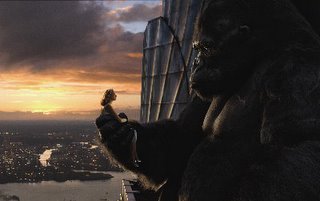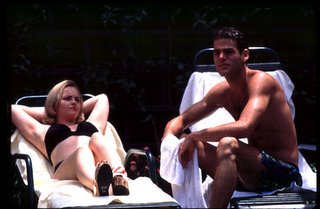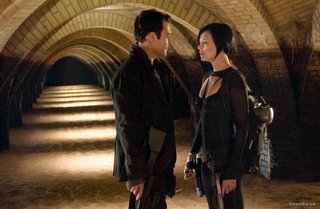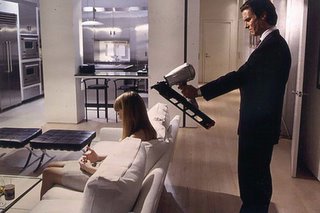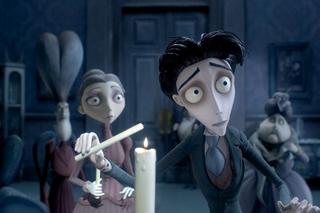 The Passion of Ayn Rand
The Passion of Ayn Rand (1999) and
Naked in New York (1993)
The Eric Stoltz Double Bill!
Plot 1: Ayn Rand's (Helen Mirren) long term affair with her protégé, Nathaniel (Eric Stoltz), destroys her marriage to Frank (Peter Fonda) and his to Barbara (Julie Delpy), which Rand encouraged in the first place.
Plot 2: Jake Briggs (Eric Stoltz) looks back on his relationship with Joanne White (Mary-Louise Parker) as he attempts to get his first post-graduation play produced on Broadway.
They're not really plot heavy movies. In fact, I wasn't even going to bother with
Passion until I saw
Naked because I started to wonder about certain things. I'll get to them a bit later.
Not unlike Wednesday's movie,
Passion is a big ol' lie. The disc jacket contained the number 15 in there somewhere, either suggesting that they had a 15 year affair or that they had a 15 year age difference. Neither is true. Rand was 25 years his senior, and their affair lasted about eight years. Technically speaking, they don't break up until much later in the film, but she effectively cuts him out of her life as soon as she finishes
Atlas Shrugged.
Of course, she gets all huffed up and face slappy, yelling about her betrayal. My response: Stuff it, Rand. I mean, capitalism? That's your philosophy? Self-interest? You were out of your ever loving mind!
More importantly, the trailer and much of the beginning of the movie, including the opening monologue by Delpy, suggests that Barbara, too, was in love with Rand, and that was the real cause of her marital strife. Any time she and Nathaniel ran into any trouble I thought, "Well, of course! She's a lesbian!" And when they finally end things, she leaves him for . . . another man. Trust me, I was confused.
Meanwhile, back in the early nineties, another nothing special kind of movie put two people I really love together (Parker and Stoltz), and then threw in Ralph Macchio for good measure. And, to be honest, he was very funny in this movie. His antics and contradictory lines (e.g. "Is this because I'm gay? Because I'm not gay.") and general being-in-love with Briggs stuff just cracked my shit up.
Of course, it's been nearly a week since the last Stoltz sighting, and I've started asking myself one important question that should have come up earlier: Why is it that I love Eric Stoltz? And the sub-question: What, exactly, do I see in him anyway?
For a while in there, I thought he was simply the older version of another redhead I have inexplicably loved for years:
Seth Green.
Now, you might be thinking that I, like the rest of my generation, fell for him as Oz during his
Buffy stint. Except that I didn't. I know because the very first episode that he was in, this exchange occurred between my mom and I:
Me: [
reads Seth Green's name in the "guest starring" credits] Seth Green's going to be on!
My mom: Who?
Me: Seth Green. [
sees Seth and points] Him!
My Mom: [
silence]
I can never quite pinpoint the exact role or year, even, when I became conscious of Green's existence. But I was, and there he was, and man, did Oz make me swoon. Of course, this devotion has proven itself out since I can reasonably consider him the most underused comedic talent of his age group, and he can charm the needles off a cactus. He's boyish and cute and self-effacing and non-threatening. He could be a screw up, or he could swoop in and save the day. I'd buy it.
But Stoltz, on the other hand, I'm even less sure about. I've been looking over his filmography, and, I swear, I only started seeing his work after I decided that I loved him. The closest I can come to picking a time when I saw him in something but didn't identify him as someone I loved was the first time I saw
Little Women. So, 1994. And I know I didn't notice you because you couldn't hold a candle to Christian Bale (see
Eflin April's Celebrity Crushes: The Original).
Sure, I appreciate you in the thankless role now, but I'm fairly certain that I thought very little of you at the time. Since then I've enjoyed you in things like
Bodies, Rest and Motion, The House of Mirth, and, most notably,
Some Kind of Wonderful. The more I think about that movie, the more it rocks. Also, as the reverse jail baiting (the jail bait baited him, but he never bit) drama teacher August Dmitri on
Once and Again.
The more I think about it, as much as you cranked out the angst as a teen, as much as Valhere in
say anything . . . /whatever you were in
Fast Times was a perfect Peter Pan stoner dude, as much as I can believe you as a dandy in period pieces, if I am going to name your defining role, it's going to be as Jamie's ex on
Mad About You.
That's right. He was in all of five episodes of
Mad About You, and that's how I think of him. A somewhat smug, educated, slightly sarcastic yuppie, slowly wrapping his tea bag string around a spoon as Jamie rants on and on about who broke up with whom first. He who orders in waffles for breakfast. He probably eats them wearing a bathrobe over full pajamas, the
New York Times folded crisply in front of him, as he plans his next Zabars trip ("Before or after the bookshop? Starbucks stop?").
I know, I know. I've thought way too much about this. But I do it, so you don't have to.
More importantly, it appears that Stoltz is a Sometimes Friend. He's nice enough, friendly and smart and funny, until his smugness overcomes him, causing him to unintentionally say something incredibly hurtful. So confident, so content. You may even describe him as poised.
Aside from the red hair and lovely light eyes, there's nothing particularly remarkable about him. This sentiment translates to any movie he has a leading role in.
So, for lying and subjecting me to your lies
, The Passion of Ayn Rand gets a D.
Naked in New York, however, has one of my all-time favourite endings. I have been saying for some time now that a movie should end with the couple just breaking up. No cheating, abuse, or tears. No moving on something better. Two people who just didn't work out. So for that, plus Macchio, plus Kathleen Turner, plus Paul Guilfoyle, you get a C+.
 Syriana (2005)
Syriana (2005)